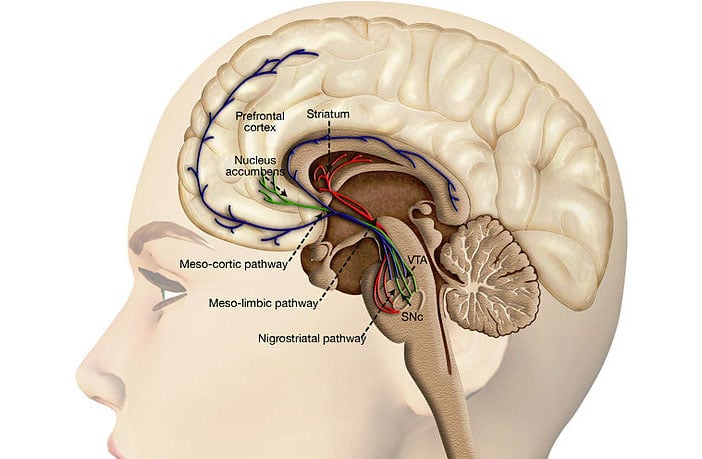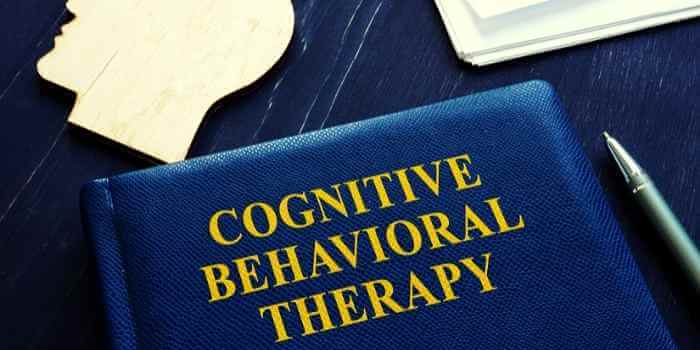
Brain chemistry has been a subject of study for many years, with new research being conducted every year. While it is not possible to attribute all cases of anxiety solely to imbalances in specific chemicals in the brain, these chemicals play a significant role in regulating our emotions and moods.
While addressing the root cause of anxiety is the ideal approach, it is important to acknowledge the role that brain chemicals play. To effectively manage anxiety, it is crucial to adopt a holistic approach, considering both chemical imbalances and other factors such as environment.
In this article, we will discuss the various brain chemicals involved in anxiety and their importance, and explore how to approach anxiety from a holistic perspective.
What Causes Anxiety?
Anxiety is a common and natural stress response, and its symptoms can vary from person to person. Our anxiety levels are influenced by a range of factors, including our sleep patterns, diet, and family history. However, when it comes to managing anxiety, there are several things to consider.
Does everyone have anxiety?
Yes. Everyone has anxiety because it’s natural to respond. Anxiety is helpful toward increasing action and making try to change. For example, suppose you have no anxiety about your life. You might not feel motivated to create a healthy environment, or you don’t want to need to optimize your mental well-being. However, anxiety is normal, but too much anxiety leads to panic attacks and might lower the quality of our life. Managing anxiety levels is the best strategy.
Sleep Deprivation Triggers Anxiety, Stress, And Fight-or-Flight

We live in a world where people juggle their demanding careers, family, and social life. This makes it challenging to maintain a healthy sleep cycle and balance emotions.
It’s hard to get a good night’s sleep when you’ve got stress hormones surging, a racing mind spinning, and too many thoughts to keep track of on your mind.
Lack of sleep affects our emotions. It alters neurotransmitters in the brain like dopamine, serotonin, and melatonin. (source)
Getting a better night’s sleep will boost your testosterone levels and your growth hormones, dopamine, and neurogenesis. ( Depression, anxiety, irritability, and other mood changes are common in men and women with low T)
Inflammation is the root cause of several illnesses, including autoimmune disorders, heart disease, and cancer.
Quercetin, a powerful antioxidant and anti-inflammatory compound, offers numerous health benefits. Studies on animals have shown that quercetin’s strong antioxidant properties can enhance mood-related behaviors in subjects that don’t get enough sleep.
Research suggests that quercetin can reduce the negative impacts of sleep deprivation on memory function, depression-like behavior, and brain cell loss in the prefrontal cortex.
In a 2016 study, researchers show quercetin may lower mice’s manic-like behavior after 24 hours of paradoxical sleep deprivation.
Sleep deprivation might worsen your anxiety and affect your personal, career, and social life.
Note: We do not recommend taking melatonin hormone as a supplement. Best way to increase melatonin level:
- Infrared light ( Which comes from the sun )
- Optimize serotonin, and B6
- EMF exposure and blue lights may affect melatonin production, so switch off smartphones, Wi-Fi, and other electrical devices before going to bed
Enough sunlight exposure will give you infrared light.
Does melatonin help with anxiety?
Melatonin counteracts cortisol which leads to a lower anxiety level. However, taking an extra dosage of synthetic melatonin won’t help you as it might be. Optimizing your melatonin level in natural ways is the best strategy for lowering stress and anxiety.
Caffeine Intake, Substance Abuse, And Coffee

Yes, most of us love coffee.
Caffeine doesn’t just give you an energy boost; it also helps support healthy dopamine sensitivity, which is excellent.
But, when it comes to anxiety, you might be rethinking again. Some of the population has caffeine intolerance.
Caffeine makes your anxiety symptoms worsen by increasing cortisol stress levels.
Too much caffeine also affect sleep quality which causes worse anxiety level. Caffeine may boost glutamate activity and inhibit the release of GABA, resulting in a more alert state of mind. Anxiety, panic attacks, heart palpitations, and inability to sleep are all things that some people attribute to issues with GABA deficiency symptoms.
Related: Relaxing, and Focusing: GABA and Glutamate in the Human Brain
Other things you might consider:
- B vitamins
- Magnesium
- Sodium
- Potassium
Caffeine structure gets rid of these things. So, these minerals and vitamins are essential to control anxiety levels!
Does coffee a bad guy?
No. coffee isn’t bad if you drink the right amount. Yet, anxious people might affect more by caffeine. For most populations, a moderate amount of coffee is healthy.
If you have anxiety and you still want to drink coffee, there are some strategies such as:
- Optimize vitamin C ( help mobilize caffeine faster in the blood)
- Magnesium
- Potassium
- Increase B1 vitamin
- Decaffeinated coffee
You can do those things to lower the effect of caffeine.
Anxiety can be immobilizing, affecting how people eat, sleep, and participate in everyday activities. It can also be debilitating, preventing people from living the lives they want. Limiting our caffeine intake is the thing we should consider.
Be Careful about Magnesium Deficiency
Magnesium deficiency can lead to many health consequences, but the medical industry often overlooks it.
An estimated 80% of the global population is not getting enough magnesium. And most people can’t tell if they’re at risk.
Too little magnesium can result in significant consequences- including heart palpitations, constipation, anxiety, and even depression. Some severe health conditions like diabetes, Alzheimer’s disease, and ADHD are linked to not getting enough magnesium!
Magnesium deficiency can lead to anxiety, depression, sleep disorders, high blood pressure, an irregular heartbeat (arrhythmia), headaches, fatigue, or weakness.
Alcohol

If you think alcohol makes you get calm and relieve anxiety, think again.
Alcohol abuse is a serious problem in American society. There are many causes of alcohol abuse, including genetics, mental health conditions, and depression.
Science shows that long-term alcohol can lead to brain damage. (source)
Alcohol also changes your brain’s serotonin levels and other neurotransmitters. (source)
Craving alcohol might be related to GABA deficiency. Yet, some research show glutamine supplement is helpful for alcohol craving. (source)
It’s time to break the alcohol addiction and quit drinking for good. There are supplements and tools available to combat alcohol addiction.
Also, note regular alcohol consumption also leads to B vitamin deficiency, which worsens your anxiety level. (source)
Substance-induced Such As Cocaine, Amphetamines, and Cannabis
When it comes to relieving anxiety, depression, and other mental issues, people want to easiest ways and substances.
Like alcohol, cannabis is not different.
Research shows that using cannabis might trigger an anxiety level in some people—more THC (the active ingredient of cannabis) available in the blood, more anxiety. (source)
Don’t you believe it?
The brain area called the “hippocampus” is responsible for emotion regulation, memory, and learning.
Yet, research shows that people with hippocampus problems tend to be more depressed and anxious.
The Hippocampus area helps create new brain cells, makes a strong connection between existing cells, and protects our brain from any damage.
Chronic marijuana leads to cell death in the area of the hippocampus. (source)
Worst, in the long-run, marijuana users tend to have fewer GREY MATTER brain areas responsible for important things.
How To Optimize?
Don’t worry; exercise and meditation might help increase grey matter.
Also, research shows regular exercise help increase the hippocampus area and new brain production.
For the best result, we recommend exercising self-defense, such as Brazilian jiu-jitsu.
You can get the same benefits and more and learn how to defend yourself while socializing! crazy
The Power Of Doing NOTHINGS For Anxiety
Einstein would spend time each day just walking outside or meditative ways of looking, gazing at the environment. He knows it is a meditative experience.
Einstein certainly has more gray matter in his brain, which is the same as long-term meditators. Simply “gazing” allowed his mind space to process his thoughts, solve problems and help creative solutions.
Avoid Pornography
Porn addiction can trigger anxiety via the stimulation of dopamine receptors.
Porn addiction is a struggle that many people face. It can be a constant battle to stay sober and break the cycle of addiction.

https://www.psypost.org/2017/09/study-problematic-pornography-use-resembles-pathological-gambling-brain-49614
When you watch porn, the brain secrets dopamine; Dopamine is a neurotransmitter that regulates mood, motivation, and reward-driven behavior. The more dopamine you have in your system, the more addictive behaviors you’ll find yourself engaging in or even struggling with.
When your dopamine levels are high, you’re more likely to want to do things that give you pleasure.
The main problem is that when you get an addict to anything, you increase the chance of anxiety.
For standard and social health, avoid pornography as much as you can.
Related: Porn Addiction Dangers: What You Need to Know
Porn addiction worsens your social anxiety and even damages your sexual performance. However, the media sell that pornography is a rewarding thing.
Second Brain
Since there are so many gut neurons, many scientists now refer to the entire gut as “the second brain.”
This second brain produces something very significant in addition to controlling muscles, immune cells, and hormones. The brain’s supply of the “feel-good” chemical serotonin is increased by well-known antidepressants like Prozac, Citalopram, and Paroxetine.
You might be shocked to learn that the nerve cells in your gut produce between 80 and 90 percent of the serotonin in your body.
Dangers of Glyphosate For Gut Health and Makes Anxiety
In past years, scientists have found that glyphosate, the active ingredient in herbicides and other common weed killers, may make it harder for your body to make proteins that work properly and block the shikimate pathway (found in gut bacteria), which harmfully affects the gut health and microbial population.
Glyphosate also binds to important minerals, disrupts the synthesis and transport of sulfate, and interferes with the synthesis of aromatic amino acids(phenylalanine, tyrosine, and tryptophan) and methionine, which can cause a loss of folate and neurotransmitters, acts as an antibiotic, slows down methylation pathways, and stops the pituitary gland from releasing stimulating thyroid hormone, which can cause hypothyroidism and worsening anxiety level.
Could glyphosate be making people get Alzheimer’s?
- New research shows that Roundup’s main ingredient, glyphosate, gets into the brain and raises the risk of neurological diseases like Alzheimer’s, and impairs neurotransmitters such as serotonin and other mood-lifting anti-anxiety brain chemicals.
- Scientists have never been able to prove that glyphosate can get into the brain. Carey Gillam, a reporter, says that they also “noticed that the recent rise in using glyphosate on corn and soy crops is linked to the rise in deaths from Alzheimer’s disease and other neurodegenerative diseases.”
Artificial Sweeteners Change The Bacteria in The Gut
Researchers have shown that aspartame, sucralose, and saccharin significantly influence gut microbial balance and may contribute to long-term digestive diseases such as irritable bowel syndrome.
Avoid artificial sweeteners at all costs because they damage your oral, gut, and brain health(Aspartame functions as a chemical stressor by increasing plasma cortisol levels and triggering free radicals, leading to mitochondrial damage and impairing brain functions by lowering the amount of energy going to hippocampus area)
Also, another study showed that sucralose could negatively influence the number of friendly microbes in mice’s guts. Altering gut microbes may cause weight gain and insulin resistance by increasing inflammation, damaging mitochondria, and leading to depression, anxiety, and mental brain problems.
Low-calorie sweeteners like Stevia and erythritol are very popular in the ketogenic and holistic health communities.
Another sweetener that tastes better than others is “Xylitol” sugar alcohol which is low in calories and has a delicious taste. However, Xylitol can also impact insulin levels; use it in moderation.
Mitochondrial dysfunction and probiotics deficiency has been correlated with the loss of memory, and mood problems.
The Things Might be Helpful For A Anxiety
We mentioned what we avoid for worsening anxiety. How about the tricks that might ease helpful overcoming of anxiety?
Yes. Let’s dive into it.
1-Nutritions: Avoid Sugar, Trans Fats, And Limit Omega-6,

The more we discover new things, the more we get surprised.
It’s happened in the nutrition area too. We didn’t know about nutrition related to our emotional, physical and even spiritual levels.
The more we know, the more we understand.
Nutrition plays a significant role when it comes to anxiety. As we talked about, lack of fundamental nutrition affects our mood.
- Iodine And Selenium: The thyroid gland is crucial for energy and mood. Iodine and selenium deficiency leads to anxiety and depression. Make sure you’re optimizing your thyroid gland. (source)
- B Vitamins: B vitamins are an essential aspect of anxiety and average energy level. However, low-level B vitamins lead to anxiety too. (source)
- D Vitamin: D is essential for neurotransmitters such as serotonin and melatonin. These chemicals are related to anxiety.
- Ketogenic Diet: A ketogenic diet improves new brain cell production and memory. Also, improve blood sugar regulation and prevent anxiety attack.
- Sugar-free: Overconsumption increases blood sugar levels, increasing anxiety and suppressing BDNF production. Sugar also feeds certain bad bacteria and yeast, such as candida. Candida overgrowth in your gut has been linked to various health problems, such as yeast infections, fatigue, poor memory, depression, headaches, and a strong desire for sugar.
- Gluten-free: Consuming gluten might increase the risk of anxiety among people who has gluten sensitivity
2- Lifestyle Change: Regular Exercise

Our lifestyle changed. Society gives us a new way of rules, and these rules are not always the best for mental health.
The side effect of our society
- We become less grateful for the things we have
- We minimize the things we achieve
- Get jealous of other people’s success and life.
- No for support authentic people in a competitive world.
- Forgetting the connection of nature, not ground with the earth
- More sedentary lifestyle
Grounding is good because it reduces stress and promotes relaxation in the body by calming the neurological system and stress hormones and regulating the biological rhythms of the body.
This research reveals that being exposed to ELF-EMF for lengthy periods of time at work can affect mental health, leading to symptoms including depression, stress, anxiety, and poor sleep. (source) Grounding protects the body from potentially harmful ambient electromagnetic radiation (EMFs).
The results revealed that WiFi exposure caused a significant increase in anxiety level and affect locomotor function.
Source: https://www.ncbi.nlm.nih.gov/pmc/articles/PMC5897318/
Related: Grounding with the earth: The Most Important Health Discovery Ever?
The list can go on. But, these things make our brain chemicals unbalanced and causes worsening anxiety level.
Besides EMF, and other things, using too much social media lead us to compare ourselves to others’ lives. Research shows that spending too much on social media makes us depressed and anxious. (source)
Sure, social media isn’t bad when using moderate. Yet, most people compare themselves to social media.
Surprising Benefits Of Exercise For Gut And Nervous System
Vagus nerve, immune system, and neurotransmitters all link the brain and gut microbes, or microflora. Stress, memory, social behavior, and mood are affected by gut microbes.
Evidence suggests that different factors can determine changes in the gut microbiota. However, according to recent research, moderate exercise may increase the quantity of beneficial bacteria population, diversify the microflora, and boost the growth of probiotics.(source)
Supporting and Boosting probiotics bacteria such as Lactobacillus rhamnosus (JB-1) increases the levels of GABA in mice; GABA is the main neurotransmitter that produces a calming effect even though some people tend to have a deficiency. Finally, GABA can help lower feelings of anxiety and stress and inhibits the amygdala, preventing us from generating inappropriate emotional and behavioral responses.
3- Gratitude
Most of the time, we think we are not enough. This makes worsens our anxiety.
Feelings of gratitude are connected with an increase in neural regulation of the prefrontal cortex.
The prefrontal cortex is responsible for controlling negative emotions such as guilt, shame, and aggression. These emotions mostly lead to anxiety. (source)
Study shows that gratitude increases compassion. Gratitude also helps you get less critical about people and situations while improving subject wellbeing. (source)
Gratitude is a powerful emotion that can help you stay positive and happy. It also helps us appreciate the things we have.
Gratitude increases positive image and brain chemicals. These chemicals are directly related to your mood, emotions, and wellbeing.
4- Cope Fight Or Flight Response With Mindfulness Meditation

Who doesn’t want more confidence and success while in an anxiety-free state?
Mindfulness meditation is an effective strategy for increasing mental strength.
Mindfulness Meditation will teach you to be more aware, present, and in control of your thoughts and emotions. You’ll be able to regulate your fear more effectively.
Meditation can assist you in becoming the person you desire. It can help you in achieving your objectives and living a better life.
Meta-analysis shows that meditation stress-related anxiety and depression. (source)
Related: The Ultimate Guide for Becoming Calm Person
Mindfulness meditation now lowers anxiety and increases physical health by supporting deep sleep.
5- Self-help: Cognitive-Behavioral Therapy

Anxiety is a significant problem in today’s culture. People spend countless hours on social media and the internet yet do not feel better.
No matter how hard you attempt to regulate your worry, it always seems to discover a core reason beyond your control.
Cognitive distortions such as overgeneralizing, black-and-white thinking, catastrophizing, mind reading, jumping to conclusions, emotional reasoning, binocular trick, and mental filter can result in anxiety. For example, an overgeneralized perception that something terrible “always” happens may lead someone to have anxieties about even barely risky situations and avoid pleasant social encounters due to anticipatory worry of exposure.
The good news is that anxiousness does not have to be this way indefinitely. CBT and other strategies have enabled us to battle stress without the need for prescription medicines or treatment.
In studies, CBT is beneficial for anxiety-related illnesses such as panic disorder and generalized anxiety disorder. (source)
Cognitive Behavioral Therapy (CBT) has been proven in over 40 trials to help reduce anxiety and enhance psychological wellbeing. (source),
Cognitive-behavioral Therapy is like a philosophy. It helps you improve your logical thinking and assist in better decisions.
6- Learn Deep Breathing With Wim Hof Breathing
Wim Hof breathing exercises can help people feel more relaxed and calm and have euphoric feelings by challenging and pushing their limits.
Along with cold therapy, this can help to treat various conditions like stress, anxiety, or even depression. (source)
The testimonies on the website suggest that Wim Hof’s followers get better quality sleep and feel more energetic in the morning.
The Wim Hof Method primarily has relaxing effects and is often used as an introduction to meditation. Breathing exercises can help people feel more relaxed, calm and have euphoric feelings by challenging and pushing their own limits. Along with cold therapy, this can help to treat various conditions like stress, anxiety, or even depression.
7- Probiotics, Gut Health, And Lactobacillus (L.) Rhamnosus
- Anxiety can be influenced by gut microorganisms that communicate with the brain. This contact might take place via a variety of channels.
- The main neurotransmitters are one route. GABA and dopamine are neurotransmitters produced by gut microbes such as Bifidobacterium and Bacillus. (source)
- Neurotransmitters send signals to the neurological system of the gastrointestinal tract, which then sends messages to the brain via the vagus nerve or the spinal system.
You can optimize your gut by intermittent fasting, avoiding sugary foods, trans fats, and limiting omega-6, consuming MCT oil, Omega3, and using fermented products rich in Lactobacillus (L.) rhamnosus is a great way to start.
Studies show that Lactobacillus (L.) rhamnosus benefits GABA synthesis, which reduces anxiety.(source)
You can also eat a healthy fat ketogenic diet to affect intestinal flora positively.
Microbes can influence cytokine levels in the body, and changing cytokine levels directly affects parts of the brain, such as the hypothalamus, which initiates HPA axis activity. The HPA axis regulates cortisol production, a hormone in the body’s stress response. Cortisol levels rise when HPA activity rises, processing and reducing anxiety in stressful conditions.
Check Your Zinc Level For Mood, Depression, And Anxiety
Your body may lack enough zinc if you experience anxiety and depression. Researchers discovered low zinc serum blood levels in depressed people, suggesting that zinc deficiency may cause depressive thoughts. Also, depression shrinks your hippocampus, which is the area of your brain responsible for emotional regulation, memory, and learning.
Zinc plays a key role in treating depression and anxiety since it has been found to protect your hippocampus from the inflammation induced by emotional stress and environmental stress. Furthermore, zinc may stimulate the synthesis of brain-derived neurotrophic factor (BDNF), a critical metabolic agent required to combat brain inflammation, anxiety and depression.
Protect Your Brain Health Iron Overload
The majority of research has focused on iron-related liver injury. Unfortunately, iron overload can cause brain cells damages, and lower neurogenesis and BDNF provoke a neurotoxic effect.
People won’t aware that iron buildup or iron overload in the brain is typically related to neurodegenerative illnesses such as Parkinson’s and Alzheimer’s disease, cellular damage after a hemorrhagic stroke, and even traumatic brain injury. (source)
According to research, iron overload disrupts the balance of neurotransmitters. When iron is infused into the substantia nigra, it disrupts monoaminergic systems, notably the dopaminergic pathway, which results in Parkinson-like symptoms of motor impairment. (source)
People mostly consider iron deficiency, but in reality, iron overload might be a more common problem and a lot more dangerous than iron deficiency anemia. Why? Because there is no obvious effective iron elimination pathway (some supplements might be helpful), almost all adult males and postmenopausal women are at risk for iron excess.
In other words, these populations do not experience frequent blood loss. Some of the symptoms of iron overloads are:
- Fatigue (feeling tired a lot).
- General weakness
- Erectile Dysfunctions (iron toxicity may cause erectile dysfunction (impotence), lack of sex desire in males, and menstrual cycle absence in women.)
- Brain Fog
These are some of the iron overloads that cause inflammation, damaging mitochondria, cells, oxygen intake as well as overall health.
How To Get Rid of Excess iron
Eliminating and detoxing excess iron can be helpful for men’s and women’s health and improve erectile functions, sexuality, hormones, and cell health. Here are the tips:
- Reduce heme iron intake, and red meat will help overcome and stopped iron toxicity
- Exercise: can helps you use excess iron for energy and mitochondrial energy and the body and muscles utilize more iron while exercising and sweating.
- Milk Thistle: According to studies, milk thistle may reduce ferritin levels, improve liver health, and address other issues related to iron overload. Milk thistle polyphenols, such as silymarin and silybin, have been demonstrated to aid liver function and promote health. Milk thistle also helps to boost glutathione production, eliminating other heavy metal toxins.
- Donate blood: The best strategy for optimizing your iron level and helping others is donating blood. On average, you can give 20% of your irons in just one session of blood donation, which will help to overcome iron overloads.
Because iron can produce oxidative stress, excessive amounts can lead to blood vessels and heart disease. However, monitoring your ferritin levels to ensure they aren’t much higher than 80 ng/ml is the greatest way to protect your health.
Avoid High Dosage fluoride From Tap Water And Toothpaste.
Did you know more than any other body area, the pineal gland builds up fluoride from tap water, toothpaste, and pesticides? They build up into “crystals”, after which they “calcify,” or create a hard outer layer that people called them “pineal gland calcification.” which might lower the secretion of anti-aging sleep hormones melatonin and DM, these hormones directly related to “well-being,”, “mood”, “sleep cycle,” and “anxiety.”
As fluoride can pass both the placental and blood-brain barriers and produce neurotoxicity in people, also animal studies have found that fluoride impairs the effect on memory and learning rats.
Fluoride at high doses significantly changed the diversity of gut flora. A high fluoride intake may increase the harmful bacteria, which leads to immunity and an inflammatory response(source)
Optimize your iodine level since it helps remove fluoride from the body. You may also take high-quality curcumin for fluoride toxicity and reduce the body’s CRP (inflammatory biomarkers) levels, and helps to lower anxiety, depression, and new brain cells.
Other Things Might be Helpful When it comes to anxiety.
- Valerian Root: It’s best to lower an anxiety level by regulating GABA receptors.
- Curcumin: Research showed that curcumin helps with memory and attention, as well as a slight improvement in mood and significantly less amyloid and tau signals in the amygdala and hypothalamus, areas of the brain that control certain memory and emotional functions. When we have anxiety, we tend to hight an active amygdala.
- Rhodiola Rosea: Best adaptogen for increasing energy, mood, and depression.
- Cold Shower: Your body will get shocked
- Yoga: Long-term yoga improves positive chemicals in the brain.
- Emotional Freedom Techniques: Easy to use, and some studies support lowering anxiety.
- Hypnosis: Short and long-term effective like a meditation
- Visualization: Guided visualization will help you get calm and relaxed. When you are anxious, you’ve mainly focused on the inappropriate images. Changing the pictures of your brain is a good way.
- Proper Breathing: The most fundamental of all breathing strategies is always breathing through your nose. Mouth breathing causes hyperventilation, which reduces tissue oxygenation.(which increases cortisol level) Mouth breathing also reduces CO2 levels in your body and your ability to filter harmful contaminants from the air. Mouth breathing can also raise your heart rate and blood pressure, which can cause lethargy and dizziness. (source)
Finally thoughts
It’s okay to be not okay.
Optimize Your body, life, and Soul
How does anxiety affect sports performance?
First, anxiety affects our sleep patterns. Lack of sleep might cause lowering our energy level and growth hormone secretion. Growth hormone can help increase protein synthesis and prevent muscle loss. High anxiety also leads to fatigue.
Does yoga work for anxiety and stress?
Yoga is a great way to lower an anxiety level while getting in shape. The breathing techniques in will help you get centered. While some people find yoga, Philosophy also helps see the world more relaxed, which leads to lower anxiety levels.
Can nicotine cause anxiety?
Nicotine is a stimulant for increasing short-term memory and dopamine receptors. However, nicotine is also an addictive substance that worsens anxiety levels. Addiction itself is the leading cause of most anxieties. For example, when you stop using nicotine, you might feel crashed.
Could hormone imbalance cause anxiety?
Yes, Thyroid hormone imbalance is the leading cause of anxiety. For men, low-level testosterone hormone also increases depression and anxiety levels. To optimize hormones level, you need good quality fats, sleep, and lowering stress levels through meditation and other stuff. Besides, you can add adaptogens such as Rhodiola Rosea. Yet, some foods make worsening hormone imbalances, such as milk and gluten.
.